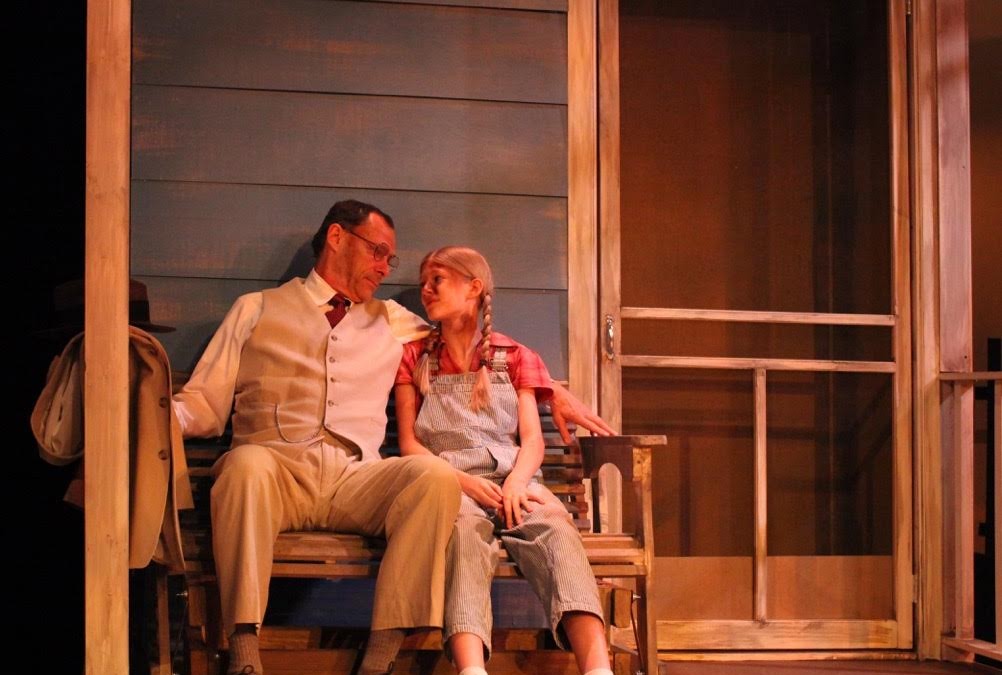The epitome of a story fueled by justice, the classic American novel To Kill A Mockingbird transformed into a play and opened Wednesday night in Shamblin Theater and ran through Sunday as part of the Christian Scholars Conference.
Since the theme of the Christian Scholars Conference was justice, To Kill A Mockingbird was chosen because of its timeless commentary on justice.
Professional actors portrayed most of the characters in the story, but Lipscomb student Shannon Clark played Mayella Ewell, the 19-year-old “white-trash” (as called in the story) female who accuses Jim Robinson, an innocent black man, of raping her.
Mike Fernandez directed the play, and Bethany Rowland, also a Lipscomb student, was the assistant director.
Tessa Bryant, the producer, said she has wanted to tell the story for a long time and was excited she now had the opportunity to do so.
“True equality, true friendship, true empowerment requires day-to-day engagement,” Bryant said, adding that she hoped the show would inspire the audience — the “jury” — to make that commitment.
The children in the play were skillfully portrayed by Hannah Trausht, starring as Scout, William Hearn as Jem and Charlie Webb as Dill.
Chip Arnold starred as Atticus and Arnold’s real-life sister Nan Gurley played Maudie Atkinson.
Arnold and Gurley’s father was a professor in the music and drama department for over 30 years at Lipscomb. In 1955, Arnold was in his first Lipscomb play as a boy.
“One of the biggest joys I have is that I get to work with my sister again, and together we can honor our father’s legacy at Lipscomb,” Arnold said.
This is the second time Arnold has played Atticus in To Kill A Mockingbird, and he said the play has impacted him personally.
“It just reminds me of my own humanity, which is just one of the best things that can happen to a person,” Arnold said, noting, “whether you are a professional artist or any person.”
Arnold said the story is reflective of the overall journey of life — what we can learn from it, and also what we can refine as a result for the better.
“This play is a great example of holding up a mirror to life and saying, ‘Okay, this is how far we’ve come, but this is how much more we’ve got to do to improve our relationships with one another.’ It’s the whole ‘love your neighbor as yourself’ philosophy.”
The play also featured a talkback session with three prestigious Tennessee lawyers afterwards: Donald Capparella, Billye Sanders and the Honorable Richard Dinkins, discussing justice, how the play still applies to situations today and how the story continues to live on in infamy, especially among law, justice and society circles.
“This play is very powerful to me, and it introduced me to the concept of justice, so I think it was a very big influence to me in becoming a lawyer,” Capparella said.
When Caparella was 14, he played Heck Tate in the school play. Caparella observed that each time he reads the story or sees the play, it affects him in a different way.
“The notes that this hit for me tonight were of all the recent injustices with black people having been shot by police,” Caparella said.
Sanders, too, pointed this out, noting that the fact that despite the many years which have passed since 1935, the year the tale takes place, not a lot has changed, as she referenced the Trayvon Martin case.
Despite the jury being “the cornerstone of the justice system,” as Judge Dinkins said in the talkback session, the jury in the story cannot see past their prejudices, which indirectly leads to Robinson’s death.
During the talkback, the lawyers concluded by stating that humanity has a long way to go before beginning to see every person equally.
Ultimately, the play tells a story about justice — the great distance mankind must travel before fully treating one another as equals, as Arnold mused. One of the most particularly powerful dialogues (and main message) in the play is when Atticus tells Scout about the importance of seeing things from someone else’s perspective.
“There’s something I’d like to ask. If you’ll do it, you’ll get along a lot better with all kinds. You see, you never really understand a person until you consider things from his point of view. Until you climb into his skin and walk around it.”
Carousel photo courtesy of Ken Stilger
Photo gallery courtesy of Lipscomb College of Entertainment and the Arts, Kristi Jones and Stilger.

